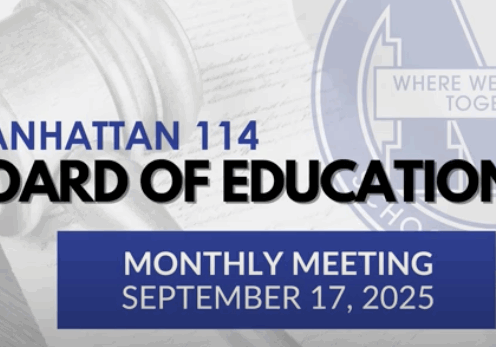
Manhattan School District 114 Approves $41.5 Million Budget for FY26
Article Summary: The Manhattan School District 114 Board of Education unanimously approved a fiscal year 2026 budget with $41.5 million in expenditures, a figure significantly influenced by the final costs associated with its major capital construction projects, including the new junior high school.
FY26 Budget Key Points:
-
The budget projects $31.5 million in revenue against $41.5 million in expenditures.
-
The nearly $10 million deficit is attributed to the completion of capital projects funded by previously issued bonds.
-
Local property taxes account for 68% of the district’s total revenue.
-
Salaries and employee benefits represent the largest expenditure categories.
MANHATTAN – The Manhattan School District 114 Board of Education gave its final approval Wednesday to a budget for the 2026 fiscal year that plans for $41.5 million in spending, driven largely by the conclusion of major building projects.
Following a brief public hearing where no comments were made, the board voted unanimously to adopt the budget. The plan anticipates total revenues of approximately $31.5 million, marking a 3.5% increase from the previous year.
During a presentation, Superintendent Dr. Damien Aherne explained that the large discrepancy between revenues and expenditures is a planned result of paying out the final costs for capital improvements.
“The discrepancy that you see between our revenues and expenditures are due to the capital project being complete,” Dr. Aherne said. He noted that the new district office project is about 99% finished and the district will soon wrap up all related expenses.
The district’s revenue is heavily reliant on local sources, with property taxes making up $21.5 million, or 68% of total income. State sources contribute about $9.3 million (30%), while federal funding provides approximately $650,000.
On the expenditure side, salaries remain the largest single cost at $14.7 million, accounting for 47% of revenues. Employee benefits total just over $4 million, or 13%. Another significant category is “Other Objects,” which at $16.1 million (39% of expenditures) includes interest payments on outstanding bonds, capital project costs, and special education tuition. Purchased services, which include transportation, insurance, and legal fees, are budgeted at $5.3 million.
Dr. Aherne noted that the final budget saw minor increases from the tentative version presented in August. The changes were primarily due to the settlement of contract negotiations, which clarified the actual costs for benefits, hourly wages, and stipends. “Our estimates were actually quite close in the tentative budget back in August,” he said.
The budget was on public display for over 30 days following the presentation of the tentative budget at the August board meeting, in accordance with state law.
Latest News Stories

Will County Committee Denies Appeal for Crete Township ‘Tiny Home’ Permit

Judge: Biden-era decree deal requires release of 600+ from ICE detention

Poll: Majority believe free speech in U.S. headed in wrong direction

Illinois quick hits: Chicago treasurer to boycott U.S. securities to protest against Trump; Governor marks opening of new union training center; Illinois farms expected to lose $67.2 million a year

Trump signs executive order to improve foster care

Hegseth announces Operation Southern Spear, targeting narco-terrorists

Justice Department accuses California of racial gerrymandering in redistricting plan

Illinois quick hits: WARN Act reporting shows 1,600 job losses in October

Pritzker, alders oppose Chicago tax plans, property tax hike could be next

State Department designates European Antifa groups foreign terror organizations

NetChoice scores legal win in social media warning lawsuit

Union Pacific–Norfolk Southern merger draws more support as critics push back


